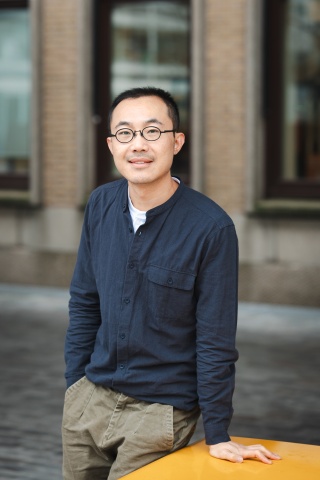Bin Yu launched as associate professor of Interaction Design for Emerging Technology
11-11-2024

From 1 November, Bin Yu joined the Digital Life research group as associate professor. He will focus on the Interaction Design for Emerging Technology research line. With a multidisciplinary background in biomedical engineering, industrial design and Human-Computer Interaction (HCI), Bin brings a unique perspective to his work.
Positive AI for healthy living
Bin Yu is a design researcher specialising in HCI and health technology. At the Digital Life research group, Bin will contribute to the Interaction Design for Emerging Technologies research line, with a particular focus on HCI design for data-centred and advanced medical systems. Bin: 'Over the past decades, AI has proven to have a major impact on our lives. While AI has the potential for significant positive change, it can also contribute to negative behavioural changes that can affect our health.
Think, for example, of AI algorithms on social media that are tailored to individual preferences. These algorithms aim to increase user engagement, but can lead to unhealthy habits, reduced attention span and disrupted sleep patterns. My research is driven by a fascination with this dual nature of AI and other emerging technologies and aims to explore how these technologies can be used to improve lives while mitigating potential harm. By designing and deploying technology responsibly, we can create a future where innovation promotes well-being rather than endangering it.'
Human-centred AI for healthcare
AI has become a powerful tool in computer-aided diagnosis. Yet it remains a challenge to apply AI solutions widely in healthcare. 'This is often due to overconfidence or lack of confidence in AI, as well as poor integration with existing workflows. I have focused on designing and developing human-centric AI solutions for clinical practice and radiology. In my research, I look at how we can improve user interfaces, data representations and interaction flows to better fit what radiologists need. I am also investigating how the processes and results of AI can be visualised to increase understanding and facilitate adoption.'
Exploring together
All these efforts have led to a number of crucial research questions that Bin at Digital Life will explore further. 'How can we integrate AI into current healthcare work processes in such a way that work can be done more efficiently and effectively? How can we smartly divide the tasks of AI and doctors so that they can work better together? And how can we develop techniques that help users better understand what AI can and cannot do, and how AI makes decisions, leading to greater trust in AI and successful application in healthcare? If you share my interest in these questions, I invite you to join me in exploring these exciting research directions,' Bin concludes.
Bin is also welcomed by Dean Frank Kresin: 'I am delighted to welcome Bin Yu to FDMCI as associate professor in Interaction Design for Emerging Technology. With his background in Human-Computer Interaction, Data Science, Data Design & Design Research, he has excellent qualities to strengthen our research and teaching in this field. Technology is changing the way we design and what we can - and want to - design in an equally rapidly changing society. This is having a major impact on almost all our fields of study and I am therefore looking forward to his contribution to the further development of our faculty.'

